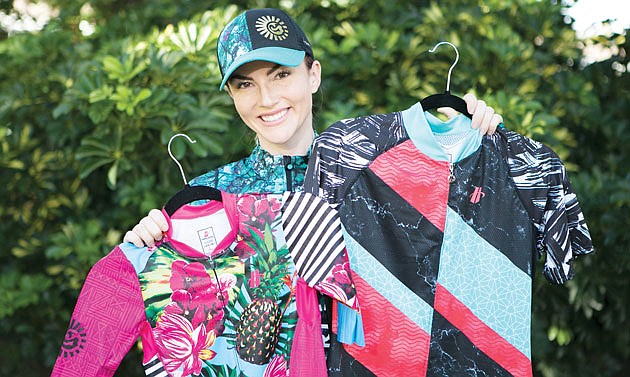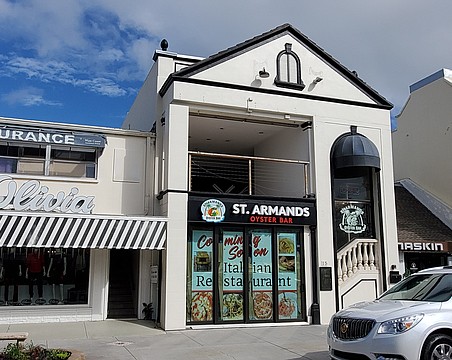Four years ago, Stefani Schuetz was diagnosed with stage II melanoma skin cancer.
Before that moment, the then 25-year-old didn't think much of running outside to train for triathlons in a sports bra with no sunscreen. “I didn't know it was going to be threatening my life,” she says.
After the melanoma was removed from the back of her right thigh, she returned to training. She started competing in triathlons when she was 18, and she didn't want to stop. But now things were different. There were no more casual sun-drenched runs.
Schuetz began running before the sun rose and got creative with the clothing she wore to train, layering items to cover up her skin.
A Sarasota resident, Schuetz also searched online for sun protective apparel, and was surprised when she couldn't find many options. She found men's clothing items for activities such as fishing, but what was lacking was sun protective apparel for women involved in high-performance sports like running, biking and swimming — the three traditional triathlon events.
Then, while on a 100-mile bike ride, with the heat from all her layers of clothing getting to her, Schuetz had an idea. She would start her own line.
Bright Beginning
Two years ago, in September 2015, Schuetz got to work developing her brand. A former radiology technician with no experience running a business, Schuetz thought of a name for her company, Tri Sirena, by combining “Tri” for triathlon and “Sirena” for the word “mermaid” in Italian.
She found a website designer and a graphic designer, and they helped her build a website for the Sarasota-based company and draft Tri Sirena logos.
Then she found a factory to make the apparel, a process Schuetz says is “so much harder than you would think.” The factories don't advertise, she says, and she found them through other suppliers at conventions. Now she uses fabric from Europe and factories in three countries.
With no experience in fashion design, Schuetz says she drew a picture of what she wanted her first product to look like and sent it to the factory with notes about the type of pocket and sleeve she preferred.
She worked on that inaugural performance wear piece for a year and a half before she received the actual product. It involved “a lot of trial and error,” she says, and “back and forth” with the factory. In the meantime, she put graphic T-shirts and water bottles up for sale on her website to start building her brand and product base. In April 2017, she launched the performance wear apparel with SPF 50 protection. Schuetz, now 29, says she's working on drawings and notes for 2018 designs.
Schuetz says she doesn't pay herself a salary, and all of Tri Sirena's sales go back into the business. She paid for the company's startup costs by living modestly with her husband — renting “the cheapest house we can find” and regularly practicing the fine art of bargain shopping. “We do all of those things to save as much money as possible to invest money into the business,” she says.
Tri Sirena products include tops, shorts and jerseys in a variety of patterns. The sun protection stays in the fabric for 90 washes, she says. Protection from the sun is Schuetz's highest priority, but the designs are important, too. “You can still be feminine and be into sports, races and things that make you dirty,” she says.
Ambassadorial mission
Awareness is a big part of Tri Sirena's mission, beyond selling clothing. Schuetz wants people to know about melanoma, how to prevent it and how covering up with sun protective apparel can help.
To help spread the word about Tri Sirena and its mission, Schuetz is using “siren luminaries” around the country. The brand ambassadors of sorts wear Tri Sirena apparel, post about the company on social media and share the products within their communities.
The ambassadors include 33-year-old triathlete Lynsey Capone-Smith who, like Schuetz, is a melanoma survivor.
Coming off the lacrosse field when she was 20, Capone-Smith noticed something on her arm. She got an appointment with a dermatologist and discovered she had stage I melanoma. She was diagnosed with atypical moles, or dysplastic nevi, and her body is covered in bullet hole scars where stage 0 and stage I melanomas have been removed, she says.
Last October, while recovering from the removal of stage I melanoma on her neck, she found Tri Sirena.
She wrote Schuetz, telling her Tri Sirena gear was exactly what she needed. “Without it, I would not be doing triathlons,” she says. “I would not be my healthy, active self.”
As a Tri Sirena luminary, she says the company has given her a platform to help raise awareness about melanoma and practicing sun-safe activities. Capone-Smith, who lives in Hawaii, posts about Tri Sirena on social media and tells her friends and family about it.
Like other Tri Sirena luminaries, she wears the products when she trains and competes in races. “I'm always in their SPF apparel,” she says. “I rock it all around Maui.”
Schuetz selected Capone-Smith and the other Tri Sirena luminaries for 2017 after reviewing applications from people interested in being advocates. For 2018, she plans to increase the luminaries from 25 to between 30 and 50.
The ambassadors receive Tri Sirena merchandise and regular updates about the company from Schuetz. In return, they provide feedback to her about products and patterns. “I'm always happy to talk back and forth with them,” she says.
The work the luminaries do to promote the brand also connect with sales, Schuetz says. She's seen Tri Sirena's sales grow since April and although she doesn't disclose specific sales figures, she says the company's third-quarter sales are 10 times greater than its second-quarter sales.
The products are sold online, and Schuetz says in the future the clothing will be available in stores. She also sells them at sporting events in Florida, Georgia, Tennessee, California and other places she travels. “I see big value in doing events,” she says. “At this point I've made a lot of marketing mistakes. What I've learned is nothing works better than me talking to people myself.”
Under the sun
Next year, Schuetz plans on considering the addition of new Tri Sirena products for other sports. She would like the company to expand beyond swimming, biking and running products into a general outdoor athlete brand. She also wants to expand the product line to include items for men and children.
“As soon as I feel like 'you've got this down,'” she says, she'll start to expand. One of the biggest lessons she's learned in business so far? “There's no shortcut for anything. Daily baby steps forward are the only way to go.”
A challenge moving forward, she says, is time away from her husband, 3-year-old son, 10-year-old son and two stepchildren to travel to events to promote Tri Sirena, answer emails from customers and manage manufacturing. “It's a sacrifice everyone has made,” Schuetz says. “It's like having another baby — a business baby. It gets up and cries at night.”
But she has no second thoughts. “I'm going to think about melanoma every day because it's a cancer that comes back,” she says. “I deal with it much better because I'm doing something. I think it would be much harder if I wasn't doing something.”






